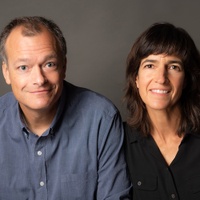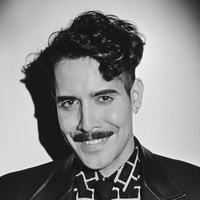As told to Lily Meyer, 2004 words.
Tags: Writing, Collaboration, Process, Inspiration.
On collaborating with your spouse
Authors Chris Bachelder and Jennifer Habel discuss what they learned from writing a book together as a married couple.Could you each start by describing your writing practice, or writing habits, when writing solo?
Jenn: I’m a very steady writer. My ideal is to write every morning, first thing. Patient, slow, deliberate, tortoise-like—really opposite from Chris.
Chris: I’m pretty streaky. I’ll go long periods in my head before I work, and then tend to work pretty quickly once I’m on a project. Early on in a project I’ll struggle, but then I’ll find the stance or vantage point that unlocks it for me, and after that I’m pretty quick.
Is it useful, in terms of household balance, that you don’t both need the same exact hours to work every day?
Jenn: Yeah, it is. Some of this is job stuff, too, but in recent years, I’ve been able to work pretty regularly, and if a kid needs to go to the doctor in the morning, Chris will say, “I can do that so you can write.” But when Chris is deep in a project, he’s there mentally a lot. When I’m done writing, I stop thinking about writing until the next morning, unless I’m walking. But I free him up for distraction in the sense that I’m on the home beat once I’m done writing.
Chris: This probably strays into an area you’re not quite asking about, but I knew intellectually about gendered differences in emotional or mental labor, but those gaps were never more apparent than when we worked together. We’d work in the morning, and then I’d see Jenn shut it off. I’m sure she would love to continue to be an art monster and think about work through the day, but there’s just a lot that she was keeping in her head for our home to run. That stark, gendered difference was really evident to me while we were writing Dayswork.
How did you start writing Dayswork* together?*
Jenn: We just—not quite fell into it, but found ourselves doing it. The project started with my obsessive reading about Melville and trying to figure out how I might write about this material myself. Because we were home together during the pandemic, we talked about it a lot more regularly, really daily, than we would have under our normal working conditions. Eventually, we realized we were writing sentences together. We’d be sitting there looking at something that I might be thinking about, and then it just dawned on us: we’re doing this together. And then we had a conversation about it and decided to formalize it—and once we’d decided we were truly collaborating, we started over.
How did that conversation feel?
Jenn: It felt like a decision. Even though we’d fallen into doing it, it still felt like a decision and a leap of faith on both of our parts. I also felt very liberated by it. It was an immediate feeling of freedom and excitement.
Chris: For gender reasons, I didn’t want to be coming in and taking over the book. It wasn’t like that at all. She was sharing her research, and getting me involved, and interested, and curious. We were deliberate about the conversation, but this was a surprise—though in a way it seemed inevitable, too. We’ve been married for 21 years, and we’ve been increasingly involved in each other’s work as first readers and editors. During the pandemic, we had both that built-up trust and a level of time that made collaboration possible. We could just enjoy the process, the dailiness, the activity of thinking a book together sentence by sentence.
Jenn: I’ve wondered too about the pandemic angle on this. We spent more time alone and isolated, and so how much did we really want to be alone while writing, too? It was appealing to write in a less solitary way during that stretch of time.
Did you write every sentence in the book together?
Chris: Every one of them.
Who typed?
Jenn: I typed.
Final control?
Jenn: Maybe so. We’re contemplating a companion book to Dayswork, and we were deciding whether to have Chris type. But the plan now is to stick with me typing, but change font.
I’m obsessed with font and I’m having a font issue—so please, tell me about your relationship with font and font changes.
Chris: I write in Times New Roman on my Dell computer. That’s who you’re dealing with here.
Jenn: I’ve had some font changes through the years, but I usually stick with one font for a long period of time. But I do like that I use one font for my creative writing at home, and then a different font at work. Garamond at home, Calibri at work. You need some kind of change. You know, the poet Heid Erdrich gets a new chair for every book she writes. When she finishes a book, she gives the chair away.
How did you know Dayswork was done? Did you know separately or together?
Jenn: We knew together.
Chris: We were remarkably in sync on this book. We shared a vision for this book, even when our vision was wrong. Solo, this happens all the time: you have a vision you’re trying to execute, it doesn’t work, and it shifts on you. But the same thing happened for us here. We were both all in on the wrong vision, and then switched it together, and then had a real sense of when it was coming to a close.
Jenn: We did do a fairly substantial revision for our editor, who wanted it in chapters. It wasn’t in chapters when we submitted it, and that was a great change. I’m so glad we did that. It opened up a lot of possibilities in the book that we hadn’t seen. So when we thought we were done, we weren’t done— but we both thought we were done at the same time.
How do you reset when you realize your vision is wrong?
Chris: I’m often resistant at first, but then once I get into it, the change seems liberating. I often try to convince myself something’s working when I know it’s not—and so the minute I start over, I can fully admit to myself that the previous way wasn’t working. So it’s a struggle at first, but then fun to reimagine a project, and a relief to get away from something that just wasn’t quite right.
What’s the relationship between creativity and time, for each of you?
Jenn: For me, the gift of time breeds creativity. Time is essential to my being able to feel creative. And time is also a teacher. If I have time to let something sit, that’s the best way for me to see it.
Chris: Jenn is, as she said earlier, deliberate, patient, daily. If something needs to start over, she just starts over. If something needs to be revised, she’s not precious about it; she’s just into the long process of making. I’m less patient in that way. I want to move things along. In this project, both those attitudes were necessary. We had a productive tension in which Jenn would slow us down beneficially, and I would speed us up beneficially.
What, again for each of you, is the relationship between parenting and creativity?
Jenn: In a way, this goes a little counter to the way Chris was just describing my process, and I’ve described my process. But parenting did put some pressure on me to use my time more efficiently and to be more flexible as a writer. It showed me that my conditions didn’t have to be exactly the way I thought they had to be in order to write, and freed me up in a way that was really beneficial. Parenting has also made writing essential to me. I need to quarantine myself mentally for some space in the day in order to write.
Chris: There are ways in which parenting is directly opposed to creativity, and destroys creativity. It robs you of your creative time and energy, and certainly takes away books you would’ve written had you not had children. But I’m less interested in that than in the way that parenting makes your imagination richer and more complicated, and so makes you a different creative self.
As a parent, I wouldn’t trade anything for being a parent, but as an artist, I wouldn’t trade it either. Parenting has made my concerns and my approach to art different and more interesting. It’s complicated my thinking. In my books, there’s a pretty stark line between pre-kids and post-kids. And I’ll just say that a lot of men, for as long as they’re able to, just get up and think about themselves. Getting married and having kids taught me not to think about myself immediately.
What are the effects of teaching and being in a university writing community on your creativity? If not what you write, then how you write or how you think about writing?
Jenn: On the one hand, it can be inspiring and generative to be around other writers and listening to visiting writers come through. On the other hand, it sometimes makes me feel like the last thing the world needs is another writer, or another creative writer in the academy. I’m lucky enough that I’ve never been trying to write for tenure considerations, so I’ve never had my writing clock be influenced by the academy, which I know happens to a lot of people and they can feel rushed.
Chris: In general, teaching books in a very smart community of readers is exciting to me. Reading their work is exciting too, but just teaching books in a small community of really smart people and great readers is pretty energizing. A great part of the job.
Reading Dayswork, I thought a lot about about marriage itself as a creative act. Does that resonate with you, or did I put that into the book because I just got married?
Chris: Partnership showed up in the book in ways that were surprising to us. It was our process, and then it showed up as a subject and as a theme in surprising ways. We’re certainly interested in the relationship between art-making and partnership in good and bad ways throughout the book. But I love this idea of marriage as a creative act. Outside of the book, we certainly felt this delight and surprise to be doing a brand-new thing after we’d been married for 19 or 20 years. It underscored the ways in which marriage is this growing, evolving thing that can constantly—just like art—surprise you, and develop in surprising ways.
Jenn: Just like each person has their own narrative, I think a marriage has a narrative too, which the two people may or may not agree on. For us, this unexpected collaboration showing up was a new and really wonderful wrinkle in our narrative. It’s a culmination of the ways we’d been working together, but it was on a whole new level, and felt totally different. And it was just really neat to have my writing practice be changed, and also to have our way of relating to each other get a new facet. It was just a great thing that happened.
Chris Bachelder Recommends:
Rebecca Lee, Bobcat
That moment in Jamel Brinkley’s story “I Happy Am” when Freddie leaves the disappointing pool party and enters Arlene’s house and everything slows down and gets very still and you get the clear sense that Brinkley didn’t at all know what would happen next.
Bird feeders
Jenn Habel Recommends:
A walk first thing in the morning
Another walk at dusk
The Elliston Poetry Collection
“American Teenager” by Ethel Cain
“I Wonder if I Will Miss the Moss” by Jane Mead




